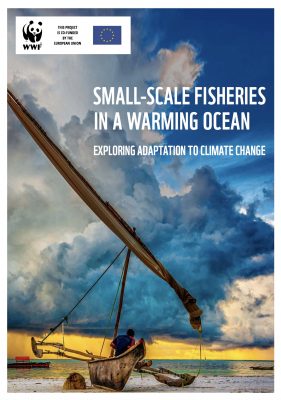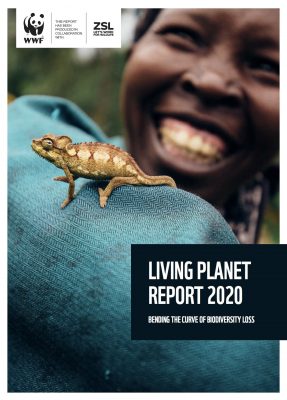Two new reports funded by the World Wildlife Fund (WWF) highlight the need for immediate action to halt the effects of climate change on ocean life.
 Tropical countries that are reliant on small-scale fisheries to sustain their local economies are poised to lose the most to climate change as fish either migrate to cooler waters or stay put and perish in warming habitats, according to the WWF report Small Scale Fisheries in a Warming Ocean: Exploring Adaptation to Climate.
Tropical countries that are reliant on small-scale fisheries to sustain their local economies are poised to lose the most to climate change as fish either migrate to cooler waters or stay put and perish in warming habitats, according to the WWF report Small Scale Fisheries in a Warming Ocean: Exploring Adaptation to Climate.
The report was produced in collaboration with the University of British Columbia (UBC), Agrocampus Ouest (France), National Institute for Fisheries (Ecuador), Charles Darwin Foundation (Galapagos) and WWF Germany. The authors of the report used climate modelling as well as interviews and workshops with local fishers to assess the current and future impacts of climate change on fish populations in Ecuador, the Philippines and South Africa.
The researchers’ climate models predicted that even after implementing a stringent, global-scale greenhouse gas mitigation strategy, the fish populations most sought-after by local fishers in the three countries would still see a significant decline. The report recommends that fishery-reliant communities start finding ways to adapt as soon as possible, and outlines policy measures that will aid in establishing sustainable fisheries sectors.
Collaborating with local fishers was critical for developing climate adaptation strategies tailored to the three countries’ unique needs, according to Juan José Alava, who is the Principal Investigator of the Ocean Pollution Research Unit and a researcher with the Institute for the Oceans and Fisheries (IOF) at UBC, who drafted the proposal with Dr. William Cheung for the project and oversaw research in Ecuador and the Galapagos Islands.
“You need to take a bottom-up approach: coming from the bottom with the local people to produce strategies that make sense to them… to produce knowledge and effective action that is based in the community,” Alava said.
Proposed strategies included things like creating “exit jobs” for fishers leaving the industry, establishing better compliance with fishing regulations through increased monitoring of the industry, and using more eco-friendly fishing vessels.
According to Alava, Ecuador’s current climate change action plan lacks detail and a vision.
He quoted the report, stating that, “In the Anthropocene, anthropogenic climate change and overfishing are intertwined, affecting and reshaping foodwebs and fisheries, as well as marine biodiversity. Bold and proactive climate change adaptation strategies and government decision-making processes engaged and empowered from a bottom-up fisheries policy approaches are urgently required for healthy small-scale fisheries and sustainable management of seafoods in the face of global environmental changes for generations to come. The WWF-Fish Forward report provides one of the first adaptation frameworks and concerted guidance for fisheries, based on several study cases from around the global ocean, including our last Eden, The Galapagos Islands, to foster and accomplish that pathway.”
“We want all of this information to be used to guide decision-making at the government level so that policy-makers can incorporate it in the national program for adaptation to climate change and so we can rely on sustainable fisheries in the long-term,” he said.
William Cheung, a researcher with the IOF who was co-principal-investigator for the study, said he is optimistic that its findings will help shape policy in the three countries.
“With the workshops we noticed that people are already feeling the effects of climate change on their resources. Many people who are dependent on marine resources, particularly people in the developing tropical countries included in this report are most vulnerable. There’s a demand for guidance and knowledge that can help them develop effective adaptation strategies, which is why I think the report is timely and I am positive it will be a useful resource to support local policy makers,” Cheung said.
 Cheung also contributed to a second report recently released by the WWF. The Living Planet Report is a collaborative document produced by researchers who track the abundance of a variety of wildlife populations and species. The WWF invited environmental researchers from diverse backgrounds to add their knowledge of humanity’s growing impact on wildlife to the report, which is published every two years.
Cheung also contributed to a second report recently released by the WWF. The Living Planet Report is a collaborative document produced by researchers who track the abundance of a variety of wildlife populations and species. The WWF invited environmental researchers from diverse backgrounds to add their knowledge of humanity’s growing impact on wildlife to the report, which is published every two years.
Cheung’s contribution explored the consequences fish-dependent communities will face if pollution and greenhouse gases continue to overheat and destroy fish habitat.
As ocean temperatures rise, and ocean water becomes more acidic and oxygen-depleted, the ocean’s ability to sustain diverse life diminishes. According to the report, global fish catch potential will be reduced 20 to 24 per cent by the year 2100 if policy-makers don’t build a robust strategy to limit greenhouse gas emissions.
Cheung, who has contributed his expertise to a number of policy recommendations in his roles as a Canada Research Chair for Ocean Sustainability and Global Change, and Director of Science with the Nereus program, said governments need to get serious about instituting a robust carbon tax and increasing their nations’ reliance on renewable energy sources.
“I hope that people recognize that we are in a situation where immediate action is needed,” Cheung said. “There is no time for delay. But then we also must provide a pathway through which we can reverse the trend. We know how we can reverse the trend; we know what kinds of policies are needed, it’s just that we need peoples’ action to do so.”
Tags: climate change, CORU, extinction, faculty, fisheries management, IOF Research Associates, Juan Jose Alava, Research, small-scale fisheries, species distribution, William Cheung